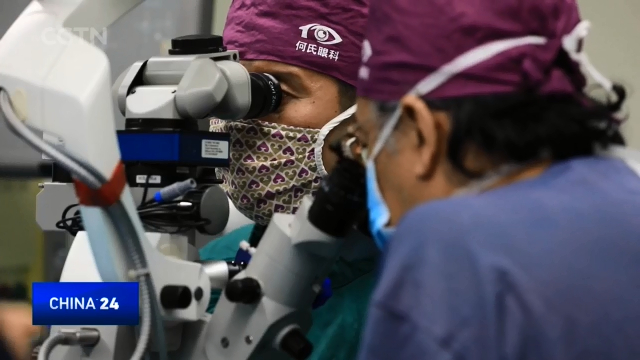
21:10, 20-Jun-2018
Genome Research Helps Children with Inherited Eye Diseases
03:16

Blurry, fuzzy, unrecognizable, 17-year-old Lu Rongkai was born into a world most of us will never know.
LU RONGKAI "As far back as I can remember, I have not been able to see clearly. When I went to school, I was certainly different."
Lu's diagnosis: a cata-ract coupled with congenital high myopia. In simpler terms, he cannot see in bright light or if objects are more than a few centimeters away.
LU RONGKAI "On a day with no sunshine, I can still walk myself. But if the sun is out, I turn blind."
Eventually, a national eye gene pool group discovered Lu. They specialize in treating rare eye diseases, thus Lu received such treatment in a hospital in the northeastern Chinese city of Shenyang. But since his surgery was performed too late in life, he won't regain full vision.
XU XINCHEN SHENYANG, LIAONING PROVINCE "Some 30 million Chinese people have been diagnosed with high myopia. And chances are high for parents with the disease to pass this extreme near-sightedness down to their children. Yet, with today's gene technology, it is possible to detect the disease faster, and offer more effective treatment.
DR. HE WEI, FOUNDER & PRESIDENT HE EYE SPECIALISTS HOSPITALS "This is the first procedure we have for genome screening to understand whether we can prevent congenital blindness."
Dr. He Wei is the founder of He Eye Specialists Hospitals. He says it is now possible to identify genetic elements triggering pathological changes before they happen.
DR. HE WEI, FOUNDER & PRESIDENT HE EYE SPECIALISTS HOSPITALS "I believe bio-technology and genome technology can help most patients. Early diagnosis can help prevent many diseases. We have the methodology and technology to intervene and delay things from happening, via early treatment."
Prenatal diagnosis or in vitro fertilization can help stop diseases from passing into the bloodline. But, these gene technologies also raise issues of privacy — especially on each individual's unique sequential codes that make up who we are.
YIN YE, CEO BGI "We have to make sure patients are in the know, and that they manage their genetic data based on Chinese people's values. We must respect the natural world while using these technologies to better lives. It's not just about technological advancement, but more importantly it is an ability to provide solutions. This should be where China is heading in terms of precision medicine."
As for Lu, he'll be able to see up to a meter away upon full recovery. And he hopes he will soon be able to read and attend university so that he can make a better life for himself. XXC, CGTN, Shenyang, Liaoning Province.

SITEMAP
Copyright © 2018 CGTN. Beijing ICP prepared NO.16065310-3
Copyright © 2018 CGTN. Beijing ICP prepared NO.16065310-3